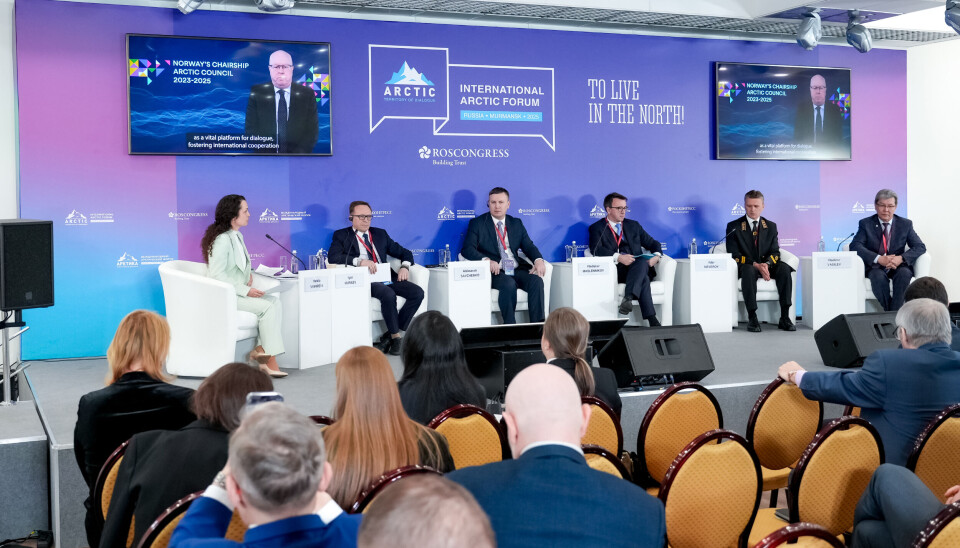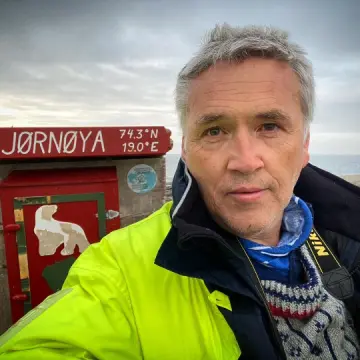
Norway’s Arctic ambassador speaks at Putin's Murmansk congress via video
"It is quite peculiar that Norway chooses to participate in this kind of state-sponsored propaganda event, in a time when it is more clear than ever that Russia is set on confrontation with the West, says Professor Kari Aga Myklebost with the UiT Arctic University of Norway.
The Norwegian diplomat's greetings was framed next under Vladimir Putin on the web-portal of the high-profile Arctic Forum as the opening day was concluded in Murmansk on Wednesday.
Putin praised the few international participants.
"We are committed to working together with all interested partner nations and intergovernmental organisations in this major endeavour," dictator Putin said in his greetings as Russia's high-profile Arctic Forum started in Murmansk.
Putin himself came to Murmansk Thursday afternoon.
In the Kirov palace of culture, where Arctic Forum takes place, he was followed by the Commander of the Navy, Admiral Aleksandr Moiseev. According to the Kremlin's press service, Putin will discuss Arctic security, including possible construction of more nuclear-powered icebreakers.
The Arctic Forum takes place amid heightened tensions between Russia and the other Arctic nations.
This is the first time Murmansk is the venue. In previous years, the conference took place in Arkhangelsk, but was then moved to St. Petersburg because of its high numbers of participants that no venue in Arkhangelsk could facilitate.
Moscow has repeatedly said the Arctic is an area for cooperation, not confrontation. Russia is actively seeking allies to expand its influence in the region, mainly among BRICS countries, but is troubled by Western sanctions on petroleum, metals, shipping and technology.
None of the other six Arctic nations participated with greetings like Norway's Arctic Ambassador, Morten Høglund.
The Arctic Council was placed in pause mode in March 2022 following Russia’s all-out war on Ukraine. Moscow has not left the council, but stopped paying their share of the costs.
Under Norway's chairship (2023-2025), contacts with Moscow are resumed in some working groups, although no political discussions take place.
Gratitude to Russia
In his video-speech to the session in Murmansk entitled "building bridges between nations...", Norway's top Arctic official, Ambassador Morten Høglund, extended his gratitude to Russia as a counterpart for their strong engagement and cooperation throughout Norway's chairship period of the Arctic Council.
The diplomat continued:
Over the years, this Forum has established itself as a vital platform for dialogue, fostering international cooperation, and promoting sustainable development in the Arctic and Far North.
"The issues facing the Arctic are of global significance and only through international cooperation and collective action can we achieve a sustainable and vibrant future for all,” Høglund said.
One of the first things Moscow did after Oslo took the chairship of the Arctic Council in 2023 was to list Norway as a "very unfriendly" country.
Among the others in the panel at Ambassador Høglund's session was Ildar Neverov, the CEO of Arktikugol, Russia's state-owned company running the Barentsburg settlement at Svalbard. In Murmansk, Neverov had dressed up in uniform.
He has been involved in staging a number of provocations on Svalbard since 2022, including military-stylish events and symbols.

Morten Høglund emphasized "the importance of working together" ... with the permanent participants of the Arctic Council, such as the Russian Association of Indigenous Peoples of the North, Siberia, and the Far East of the Russian Federation.
Høglund did not mention that the organisation, known as RAIPON, has been fully controlled by the Kremlin since 2012 when the Ministry of Justice first ordered the organisation closed. In 2013, RAIPON continued to exists after Moscow staged an election of a new board, loyal to Putin.
"Arctic power"
Vladimir Putin's Arctic advisor, Anton Kobyakov, was also in the panel in Murmansk on Wednesday. He said Russia is the leading Arctic power and plays an essential role in ensuring "... international dialogue in the North."
Kobyakov underlined that "... any attempt to exclude Russia from the discussion of global issues affecting the High North is absolutely unacceptable and counterproductive."
Asked by the Barents Observer about why Norway, as the only non-Russian Arctic nation, decided to participate at Putin's Arctic propaganda Forum, the Foreign Ministry in Oslo says Høglund's participation should not be seen as a Norwegian participation.
"Norwegian authorities are not participating in the conference, but Morten Høglund, who heads the Arctic Council at official level, is participating with a pre-recorded video about the work of the Arctic Council and Norwegian leadership priorities," says Cecilie Skjennald, communication advisor with the ministry, in an email.
"As the current chair of the Arctic Council, Norway communicates with all member states," Skjennald underlines.
State-sponsored propaganda
Professor Kari Aga Myklebost with the UiT Arctic University of Norway is an expert on Russia's Arctic policies and Norway's historical relations with Russia in northern regions.
She says to the Barents Observer that the on-going Arctic Forum conference in Murmansk plays an important role in Russia’s double-act and subversion in international affairs.
"The conference is propagating an image of Russia as a friendly player in Arctic affairs amidst its bloody warfare in Ukraine and growing hybrid operations in Europe, not least in the North."
The professor questions Norway's participation.
"It is quite peculiar that Norway chooses to participate in this kind of state-sponsored propaganda event, in a time when it is more clear than ever that Russia is set on confrontation with the West," Myklebost says.
She adds: "We should not be seduced by current Russian policy statements on collaboration in the Arctic, but read them as part of Moscow’s information operations. Russia applies this kind of rhetoric to place herself in a position to deny accusations of hostile acts, such as the cutting of sea-bed cables and other provocations."


















